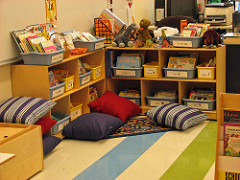Science classroom libraries
By Mary Bigelow
Posted on 2017-01-13
I am a new elementary librarian, and I want to prioritize science nonfiction. I’m looking for suggestions to help teachers who often do not have time to collect books from the library. I also n eed ideas for books to purchase. — J., New York
eed ideas for books to purchase. — J., New York
I spoke with a librarian colleague, who did what you are considering. She suggested asking teachers for a schedule of topics they work on throughout the year. She had a large plastic tub for each classroom where she put corresponding books covering a range of reading levels. For each unit, the classroom received a new set of supplementary books. She often had older students or parent volunteers prepare the boxes.
To find appropriate titles for all grade levels, I have used the NSTA website. Outstanding Science Trade Books for Students K–12 and the Best STEM Books K-12 contain lists compiled by NSTA in association with the Children’s Book Council. The titles are listed by year and include an annotated description of each book. NSTA Recommends also has monthly updates in the NSTA journals.
All of these titles are also in the second source, NSTA Recommends. This is a broader, searchable list that includes reviews of books and other media. The reviews are written by science educators and can be searched by format (e.g., print, kits, DVDs), keywords (e.g., weather, machines, insects), and grade level (K through college). The lists can be exported as Excel spreadsheets.
The School Library Journal also has a list of recommended Science and Nature Books for Kids.
Some teachers might be willing to help you select the books or suggest topics—perhaps during a faculty meeting or workshop on science and reading.
Photo: https://farm2.staticflickr.com/1033/1333506858_2f1392116d_m_d.jpg
Disclaimer: The views expressed in this blog post are those of the author(s) and do not necessarily reflect the official position of the National Science Teaching Association (NSTA).


